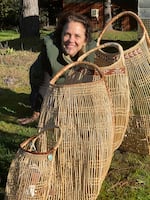Indigenous people have used cradle baskets to hold and transport babies since time immemorial. Sophie Weinstein comes from a long line of master basket weavers who take pride in keeping the tradition alive. Last week, museum staff told the young mother to remove the traditional willow basket holding her son — even as she visited the museum’s exhibit showcasing a Native American artist.
The incident reignited long-simmering discussion about the complex relationship Indigenous peoples have with museums, which Weinstein said have often functioned as a muscle of colonization and forced assimilation. The incident also prompted the Portland Art Museum (PAM) to revisit and revise its policies and cultural sensitivity training.
“Institutions need to critically reflect on their past and their positions in this very colonial system,” Weinstein said. “And make sure that, down to every last employee, there is training around cultural competency, and real respect for the first peoples of this continent.”
Weinstein, a citizen of the Karuk Nation and of Yurok descent, is an OB/GYN at Oregon Health & Science University. Last Saturday was her first day off in three weeks. She says she was excited to visit the Dakota Modern: The Art of Oscar Howe exhibit with visiting family members.
At the front desk, museum staff told Weinstein that backpacks aren’t allowed in the exhibits. Weinstein says her cousin, Geena Talley, assured them the basket was neither a “backpack” nor a “bag,” and shared how many Indigenous Nations have carried their babies in baskets like the one she wore for generations.
The little boy spent his first ten days of life in a basket Weinstein made for him under the guidance of Hillman and Verna Reece.
Weinstein said she began to envision her son’s basket the moment she found out she was pregnant. Each day, she and her family went out to collect materials, part of a traditional practice that requires expert mentorship and can take months to complete, depending on harvest seasons.
The basket gives her son a sense of security and comfort, Weinstein said.
Ultimately, staff gave Weinstein her tickets and allowed her to enter. But Weinstein later left the museum after a second staffer told her the basket was prohibited and said she should “take a deep breath” when Weinstein questioned the policy.

Sophie Weinstein finished her first ever baby basket days before her son was born, under the guidance of her teachers Verna Reece and Lisa Hillman, and with the support and encouragement of her husband, Chris Weinstein.
Courtesy of Sophie Weinstein / Underscore
A moving experience cut short
Inside the museum, Weinstein and her family were impressed by the carefully curated display of the 40-year career of one of the 20th century’s most innovative Native American painters: Oscar Howe, citizen of Yankton Sioux.
It was the family’s first time at the museum.
“My son was really enthralled with the gorgeous paintings,” Weinstein said. “They’re really stunning works of art and he was clearly very moved by it.” While making their way through the exhibit, Weinstein says her son started getting fussy. He began reaching out to try and touch the paintings. She figured it was time to place him in the woven willow basket her mother, expert weaver Lisa Hillman, created for him.
“He was ready for it,” she said with a chuckle. “He was kind of crawling into the baby basket.”
Shortly after placing him in the basket, another PAM employee approached and told her to remove the basket from her back because it violated museum policy. The employee offered Weinstein a stroller instead.”I was pretty upset and pointed out that the policies and their rigid enforcement have caused lots of harm in this country, and are the premise for not only racism, but the attempted genocide of our people,” Weinstein said.
At that point, she said the employee told her to “cool down and take a deep breath.”
Shaken by what she saw as ignorance on display, Weinstein left immediately. She later posted a description of the incident on Facebook, along with a photo of her son, looking happy in his basket on her back.
“The Portland Art Museum — where being Indigenous is cool as long [as] you are part of the exhibit and not actually practicing your culture,” she wrote alongside the photo. “The irony: we were at an Indigenous art exhibit. Racism is alive and well in these walls.”
The post garnered a significant amount of attention on social media. People demanded that PAM be held accountable, while also showing support and solidarity by sharing photos of their own babies in traditional willow baskets and other traditional baby carriers. Weinstein says although the incident sparked anger within her community, she believes it led to a much-needed understanding that Indigenous peoples live their cultures every day and should not be subjected to inflexible policies that bar traditional practices, especially in museums where they have to pay to see artifacts and artwork from their own cultures.
”Seeing Indigenous regalia on display is heartbreaking,” Weinstein said. “Because that’s not where they’re meant to be. They’re meant to be part of our ceremonies. They’re meant to be in our households, used and honored on a day-to-day basis.”
She takes pride in the daily practice of her culture, and in immersing her son in his culture as he grows up.
“I think for many of us, art is not an object to be gazed at, but rather it’s something that’s alive,” she said. “Our baskets and our regalia are beings that are meant to be danced in, that are meant to be used, that don’t belong to a certain person or an institution, but rather that we have the responsibility to care for the next generation. And I think that’s what makes our relationships with museums so difficult.”Still, Weinstein is appreciative of how PAM is handling this incident.
“I do want to point out that the Portland Art Museum issued a public apology, they very quickly changed their policies, they publicly acknowledged that the enforcement of policy was rigid and harmful,” Weinstein said.

Sophie Weinstein's mother, Lisa Hillman, is a master basket weaver. She poses with some of the variously sized hazel baskets she has created.
Courtesy of Sophie Weinstein / Underscore
PAM responds
Kathleen Ash-Milby, a citizen of the Navajo Nation, joined the Portland Art Museum as curator of Native American Art in 2020. She spent seven years creating the Dakota Modern: The Art of Oscar Howe exhibit. Since joining the museum, she has worked to build trust and relationships with Indigenous communities.
Ash-Milby said she wants people to know that the museum is taking this incident seriously.
“It’s not something that we’re going to brush off,” she said.
“We need to do more to prepare our staff and make sure that they are educated enough to really have a deeper understanding of some of the issues that Native people have faced, and continue to face, and are able to handle situations like this better,” Ash-Milby said.
Both Ash-Milby and PAM Director Brian Ferriso reached out to Weinstein and her family to offer complimentary tickets and free memberships to the museum.
Phillip Hillaire, a citizen of the Lummi Nation, serves on the Native American Advisory Board and sits on PAM’s Board of Trustees, said the incident surprised him. “Honestly, I don’t know that we’ve ever had a traditional baby board, ever worn in the museum outside of what’s inside the walls,” Hillaire said.
“It’s a cultural barrier that we need to overcome,” he added.
PAM Spokesman Ian Gillingham said the museum revised their policy in response to the incident.
“Like many museums we had a ‘Nothing on the back of policy,’” he said. “We have updated that to explicitly allow baby carriers of all types.” The updated policy now reads: ”We kindly request that bags, backpacks, or items larger than 11″ x 17″ x 6″ be left outside the Museum. Babies in carriers are permitted. Other bags should be carried at your side or in front, and not worn on one’s back. All items are subject to inspection. We want our visitors to feel welcome and understand that exceptions may be appropriate. Please contact us in advance of your visit or request to speak to a Visitor Services Manager upon arrival with questions.”
Gillingham said that it is up to all PAM staff to ensure that their stated goals and values of equity and inclusion are in action and that this incident shows that there is more work to do in equipping and empowering staff at all levels to create an inclusive and welcoming environment.
“It pains all of us that this is being framed as a bias incident,” Gillingham said. “We have been working hard to strengthen and heal our relationship with the Native community.”